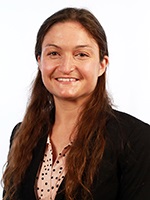Fecal Calprotectin: From Clinical Need to Laboratory Validation
This presentation will discuss the clinical applications of fecal calprotectin as a noninvasive marker for intestinal inflammation. It will also discuss the extraction methods and available fecal calprotectin assays, finishing with tips on how to verify an FDA-approved fecal calprotectin assay for deployment in a clinical lab.
Originally published on July 2, 2025
Lecture Presenter
 | Heather A. Nelson, PhD, DABCC Assistant Professor (Clinical) |
Dr. Heather Nelson is a medical director of Clinical Chemistry at ARUP Laboratories, and an assistant professor (clinical) at the University of Utah School of Medicine. She received her doctorate degree in cell and developmental biology from SUNY Upstate Medical University. She then completed fellowships in diabetes, endocrinology, and metabolism at Vanderbilt University Medical Center and in clinical chemistry from the University of Utah School of Medicine. Dr. Nelson is a diplomate of the American Board of Clinical Chemistry and a member of the Association for Diagnostics & Laboratory Medicine (ADLM). She received the 2022 AACC Annual Scientific Meeting—First Place Student Oral Presentation Award, 2022 AACC SYCL Travel grant, 2021 AACC Annual Scientific Meeting—Student Research Poster Award: Honorable mention and the 2021 ACLPS Paul E. Strandjord Young Investigator Award, Division and Academy abstract awards at the 2024 ADLM Annual Scientific Meeting for her research highlighting a need for pediatric reference ranges in advanced lipoprotein testing. Her research interests include endocrinology, diabetes, lipids, and laboratory best practices.
Objectives
After this presentation, participants will be able to:
- Explain the clinical utility of fecal calprotectin
- Discuss extraction methods and available fecal calprotectin assays
- Create an assay validation plan for laboratory testing of fecal calprotectin using an FDA-approved assay
Sponsored by:
University of Utah School of Medicine, Department of Pathology, and ARUP Laboratories
 Site Search
Site Search






